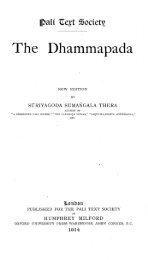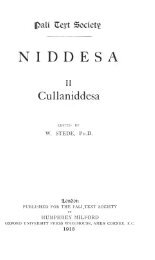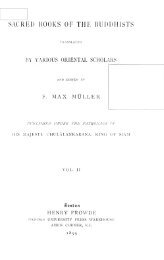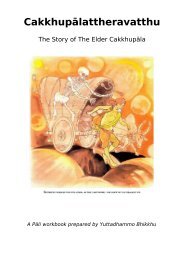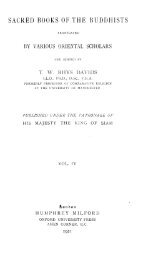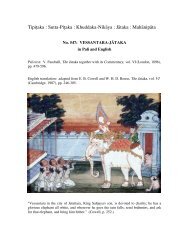Lessons In Practical Buddhism - Sirimangalo.Org
Lessons In Practical Buddhism - Sirimangalo.Org
Lessons In Practical Buddhism - Sirimangalo.Org
You also want an ePaper? Increase the reach of your titles
YUMPU automatically turns print PDFs into web optimized ePapers that Google loves.
all stem from the ways we’ve directed our minds and what<br />
we’ve clung to and identified with. All of who we are now<br />
comes under the heading of becoming, and it arises mainly<br />
because of our habits and partialities.<br />
Finally, due to becoming there arises all of our suffering, all<br />
of our stress, all of our dissatisfaction. Our creating, our<br />
conceiving, our seeking after experience, gives rise to birth,<br />
old age, sickness and death. It gives rise to this contrived<br />
existence as a human, an animal, or some other existence.<br />
We create existence for ourselves, and it is this existence<br />
that gives rise to pain, sickness, conflict, and suffering – the<br />
war, famine, poverty, and so on that exist in the world. All<br />
this can be seen to arise due to mistaken understanding of<br />
the objects of experience and the subsequent craving,<br />
clinging, and creating – the idea that somehow the objects of<br />
mundane experience can bring true peace and happiness.<br />
This is the essence of the Buddha’s teaching, summarized by<br />
the four noble truths, that craving leads to suffering. The<br />
teaching on dependent origination extrapolates on the four<br />
noble truths, pointing out that ignorance is the root cause of<br />
craving, and gives the details on the workings of the process<br />
as explained above.<br />
Summary<br />
The core of dependent origination is that ignorance leads to<br />
mental formations; due to ignorance, objective experience is<br />
followed by subjective reaction, addiction, and identification,<br />
which in turn bring suffering both in this life and in future<br />
lives. This is the essence of the Buddha’s enlightenment,<br />
and the essence of what he taught over the next forty-five<br />
years before passing away into complete freedom from<br />
suffering.<br />
The Buddha’s realization on the night of his enlightenment<br />
was that reality works in terms of cause and effect. It was<br />
not a theoretical realization. He saw reality working from<br />
moment to moment and it was due to this realization that he<br />
became enlightened. He saw that it is truly out of ignorance<br />
that we give rise to karmic intention – even the intention to<br />
help ourselves or others, to do good things for ourselves or<br />
others, to create a life that is supposedly going to make us<br />
120



